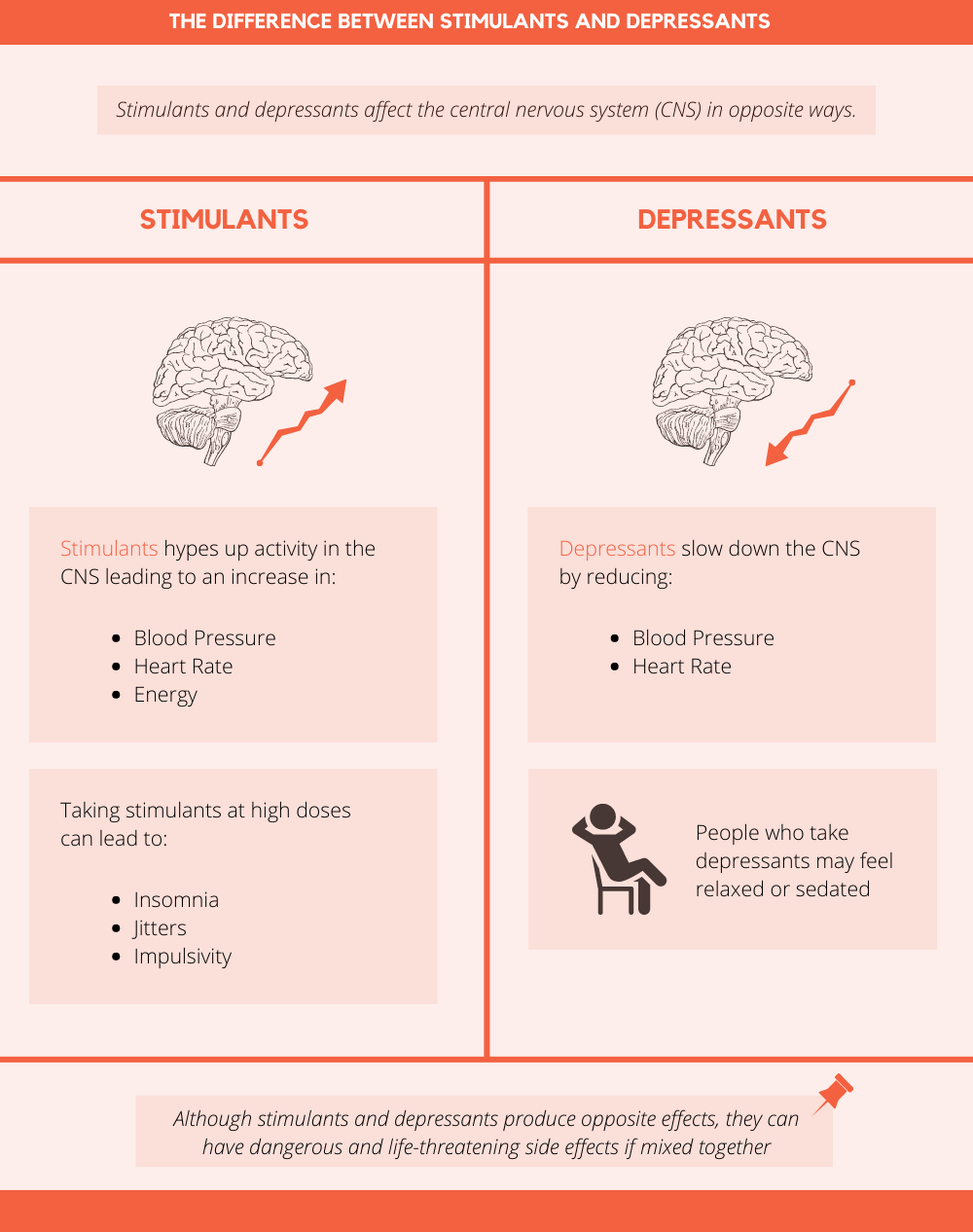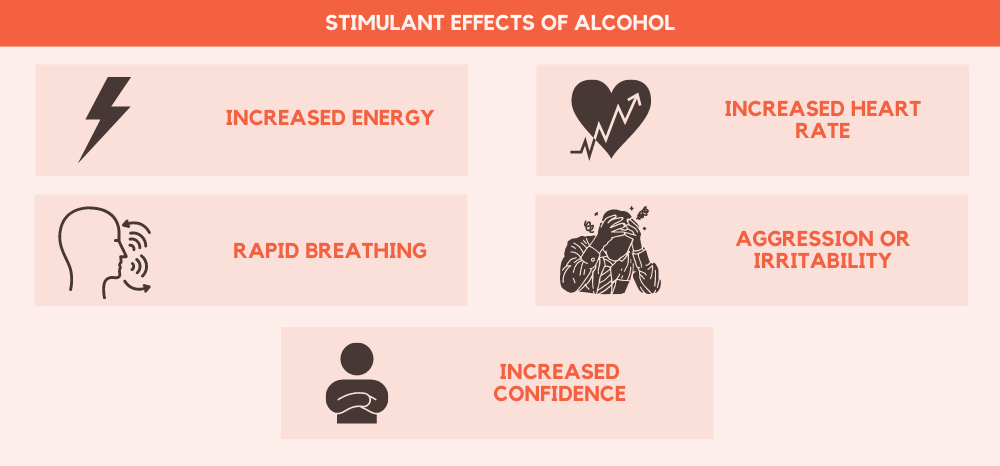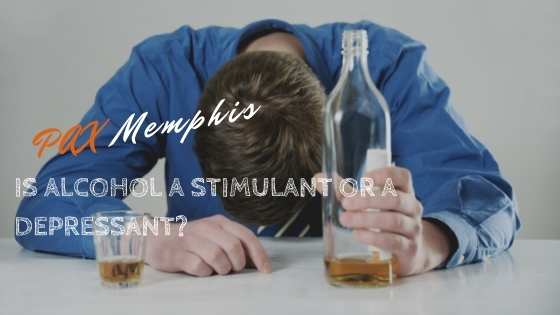People drink alcohol for its intoxicating effects. Alcohol can temporarily produce feelings of well-being and energy, however, alcohol isn’t a stimulant – alcohol is a depressant. Still, some people believe that alcohol is a stimulant because one of its immediate effects include increased heart rate. Alcohol may have initial effects that mimic those of stimulants, however, alcohol mainly slows the body down, making it a depressant.
What Makes Alcohol a Depressant?
Alcohol is a central nervous system depressant because it slows down neural activity and brain functioning. It does this by enhancing the effects of gamma-aminobutyric acid (GABA), a neurotransmitter in the brain. Reduced brain activity leads to feelings of relaxation which is why many people drink to cope with anxiety or stress.[1]
Alcohol produces similar side effects as other depressants. For example, drinking leads to slurred speech, altered perceptions, impaired decision-making capabilities, and reduced coordination. Alcohol also impairs a person’s ability to think clearly, form memories, and make healthy judgments. People who consume too much alcohol may depress their central nervous system so much that it leads to respiratory failure, alcohol poisoning, coma, or even death.
GABA isn’t the only neurotransmitter impacted by alcohol. Glutamate and dopamine are also affected by heavy drinking. GABA, dopamine, and glutamate are responsible for memory, brain function, pleasure, reward, decision-making, and more. When long-term alcohol abuse alters these neurotransmitters, people will begin drinking more often and rely on the substance to function normally.
The Difference Between Stimulants and Depressants

Stimulants and depressants affect the central nervous system (CNS) in opposite ways. Stimulants increase activity in the CNS leading to increased blood pressure, heart rate, and energy. Taking stimulants at high doses can lead to insomnia, jitters, and impulsivity.
Depressants, on the other hand, slow down the CNS by reducing blood pressure and heart rate. People who take depressants may feel relaxed or sedated. Although stimulants and depressants produce opposite effects, they can have dangerous and life-threatening side effects if mixed together.
Examples of stimulant drugs include:
- ADHD medications like Adderall and Ritalin
- Methamphetamine
- Cocaine and crack cocaine
Examples of depressant drugs include:
- Opioids such as heroin, morphine, codeine, and hydrocodone
- Benzodiazepines like Xanax, Klonopin, and Ativan
- Barbiturate medications
Some substances have characteristics of both stimulants and depressants. For example, nicotine is categorized as a stimulant even though it produces feelings of relaxation. Similarly, alcohol is a depressant that has some stimulant-like characteristics.
What Stimulant Effects Does Alcohol Produce?
Although alcohol incites both sedative and stimulant effects, it is still classified as a depressant. At low doses, however, alcohol may have stimulant-like side effects. These include:[2]

- Increased energy
- Increased heart rate
- Rapid breathing
- Aggression or irritability
- Increased confidence
People typically feel stimulant effects at lower doses of alcohol. Men are also more likely to experience these side effects while women are more likely to experience the depressant effects.[3]
Another way that alcohol is similar to stimulants is that it can reduce the amount of quality sleep a person gets. Even though alcohol can make people feel fatigued and sleepy, drinking before bed leads to fewer hours of restorative sleep, interrupted circadian rhythms, frequent bathroom trips, and breathing problems. Furthermore, people who suffer from alcohol use disorder often experience symptoms of insomnia.[4]
Does Alcohol Cause Depression?
The relationship between alcohol and depression in terms of mental health is complicated. Just because a drug is considered a depressant doesn’t mean it directly causes depression. Being classified as a depressant only means a substance has depressant effects on the CNS.
Still, depression and alcoholism are closely related. Depression is known to increase the risk of drug and alcohol abuse as some people will abuse substances to cope with their depression. This is one reason why so many people with alcoholism also suffer from depression or other co-occurring disorders.
There is also evidence that heavy drinking can alter the brain, impair the production of vital neurotransmitters, and cause the development of depression.[5] Whether depression or alcoholism comes first, it is crucial to provide these individuals with dual-diagnosis treatment that addresses both disorders simultaneously.
Find Treatment for Alcohol Abuse Today
If you or a loved one are struggling with alcoholism, it’s important to recognize that you are not alone and there are alcohol treatment options available to you. At PAX Memphis, our team of compassionate addiction specialists is dedicated to helping you find the best possible care. Contact us today to get started on your recovery journey.
References:
Medically Reviewed: September 25, 2019

All of the information on this page has been reviewed and verified by a certified addiction professional.










